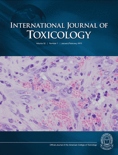
INTERNATIONAL JOURNAL OF TOXICOLOGY
Scope & Guideline
Advancing the Science of Toxicology for a Safer Tomorrow.
Introduction
Aims and Scopes
- Preclinical Safety Assessment:
The journal emphasizes rigorous preclinical studies to ensure the safety of pharmaceuticals, cosmetics, and other products. This includes evaluations of toxicity across multiple species and the development of new models for assessing safety. - Innovative Toxicology Methodologies:
A key focus is on the development and validation of new methodologies, including in vitro and in silico approaches, to assess toxicity efficiently and effectively while adhering to the principles of the 3Rs (Replacement, Reduction, and Refinement). - Regulatory Toxicology:
The journal addresses regulatory aspects of toxicology, providing insights into compliance and best practices for safety assessments required by health authorities, particularly in the context of drug development and environmental safety. - Mechanistic Studies:
Research exploring the underlying mechanisms of toxicity is a central theme, including studies on cellular responses, genetic impacts, and molecular pathways affected by various toxic agents. - Environmental and Occupational Toxicology:
The journal also covers the implications of toxic substances in environmental and occupational settings, examining exposure risks and health outcomes in affected populations.
Trending and Emerging
- In Silico Toxicology:
There is a growing emphasis on in silico approaches, utilizing computational models to predict toxicological outcomes. This trend aligns with the industry's push for more efficient and ethical testing methods. - Translational Toxicology:
Research aimed at bridging the gap between preclinical findings and clinical outcomes is gaining traction, with a focus on how findings in animal models translate to human health implications. - Neurotoxicity and Behavioral Assessments:
An increase in studies focusing on neurotoxicity and the behavioral impacts of chemical exposures reflects a growing awareness of the long-term consequences of toxic substances on neurological health. - Environmental and Ecotoxicology Studies:
Emerging themes related to environmental toxicology, including the assessment of pollutants and their effects on ecosystems, are becoming more prominent, addressing the intersection of human health and environmental safety. - Biologics and Novel Therapeutics Safety:
With the rise of biologics as therapeutic agents, there is a trend towards assessing the safety profiles of these products, highlighting the need for tailored toxicological evaluations in this area.
Declining or Waning
- Traditional Animal Testing Models:
There is a noticeable decrease in studies relying solely on traditional animal testing models as the field increasingly embraces in vitro and in silico methodologies, which are seen as more ethical and efficient. - Cosmetic Safety Assessments:
Although cosmetic safety assessments remain important, the frequency of publications specifically focused on this area has waned, possibly due to a shift towards broader topics in drug safety and environmental toxicology. - Basic Toxicological Evaluations:
The journal has seen a decline in papers focusing on basic toxicological evaluations without novel contributions or insights, as the field moves towards more complex and integrated approaches to toxicity assessment.
Similar Journals
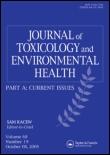
JOURNAL OF TOXICOLOGY AND ENVIRONMENTAL HEALTH-PART A-CURRENT ISSUES
Exploring Contemporary Challenges in ToxicologyJOURNAL OF TOXICOLOGY AND ENVIRONMENTAL HEALTH-PART A-CURRENT ISSUES, published by Taylor & Francis Inc, stands as a key resource in the interdisciplinary field of toxicology and environmental health. Operating under the ISSN 1528-7394 and E-ISSN 1087-2620, this journal maintains a strong presence with a Q2 category ranking in Health, Toxicology and Mutagenesis and a Q3 ranking in Toxicology as of 2023. It aims to disseminate critical findings that address contemporary issues in toxicology and environmental health, emphasizing the implications of environmental agents on human health. The journal offers both subscription and open access options, making cutting-edge research accessible to a diverse readership. With coverage of key topics from 1998 to 2024, it is an essential platform for academics, professionals, and students seeking to stay at the forefront of environmental health sciences.

Toxicological Research
Unraveling the complexities of toxic substances for better health.Toxicological Research is a prominent academic journal dedicated to advancing the field of toxicology through rigorous exploration and innovative research. Published by the Korean Society of Toxicology, this journal serves as a vital resource for researchers, professionals, and students engaged in environmental science, pharmacology, and toxicology. With an ISSN of 1976-8257 and an E-ISSN of 2234-2753, Toxicological Research highlights significant findings and discussions in the realm of health, toxicology, and mutagenesis. Although not an open-access journal, it maintains a solid reputation as evidenced by its Q3 ranking in both health-related toxicology and general toxicology categories for 2023. The journal covers a broad spectrum of topics from fundamental research to applied toxicology and provides a unique platform for the dissemination of knowledge in a field that is increasingly relevant in today’s society. With an anticipated convergence period from 2008 to 2024, Toxicological Research continues to contribute vital insights to understanding the implications of toxic substances on health and the environment.
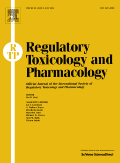
REGULATORY TOXICOLOGY AND PHARMACOLOGY
Exploring Innovative Solutions in Regulatory ScienceREGULATORY TOXICOLOGY AND PHARMACOLOGY is a prestigious peer-reviewed journal published by Academic Press Inc. Elsevier Science, dedicated to advancing knowledge in the fields of toxicology and pharmacology. With an esteemed impact factor and a current ranking of Q2 in both Medicine and Toxicology, this journal serves as a critical resource for researchers, professionals, and students interested in the regulatory aspects of drug safety and environmental toxicology. The journal publishes original research articles, reviews, and regulatory updates that reflect the latest insights and methodologies in safety assessment and toxicological research. Established in 1970, the journal continues to play an integral role in shaping the scientific discourse around regulatory practices in pharmacology, ensuring that both academic and practical perspectives are captured. Readers can access the articles through subscription services, allowing them to stay informed of the most significant developments in the field.
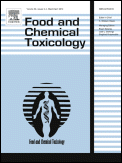
FOOD AND CHEMICAL TOXICOLOGY
Innovating research to safeguard our food supply.FOOD AND CHEMICAL TOXICOLOGY, published by Pergamon-Elsevier Science Ltd, is a prestigious journal with a significant impact in the fields of food science, medicine, and toxicology, reflecting its Q1 and Q2 quartile rankings in various categories as of 2023. Established in 1982, this journal continues to serve as an essential platform for disseminating high-quality research focused on the toxicological assessment of foods and chemicals, aiming to advance knowledge that affects public health and safety. With a pivotal role in integrating diverse disciplines, including pharmacology and agricultural sciences, the journal ranks impressively within the top percentiles—specifically 95th in Toxicology and 92nd in Food Science on the Scopus metrics. Though it operates on a traditional subscription model, the journal is committed to providing valuable insights and findings to researchers, professionals, and students across the globe, making it a vital resource in the ongoing discourse around food safety and environmental health. Its comprehensive scope underscores its importance in shaping evidence-based policies and practices.
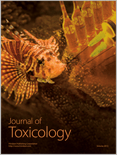
Journal of Toxicology
Disseminating vital findings for a safer tomorrow.Journal of Toxicology, published by HINDAWI LTD, stands as a pivotal open-access journal in the fields of toxicology and pharmacology since its inception in 2009. With an ISSN of 1687-8191 and an E-ISSN of 1687-8205, this journal is dedicated to disseminating high-quality research that critically examines the effects of toxic substances on living organisms. Located in Egypt and operating from their London office, it aims to provide an extensive platform for researchers worldwide to share findings that can inform better practices in safety and regulation. As of 2023, it has achieved significant recognition, holding a Q3 ranking in both the pharmacology and toxicology categories, and is indexed in Scopus with noteworthy percentile rankings (Toxicology: 57th and Pharmacology: 55th). With a focus on innovative studies and emerging areas such as environmental toxicology, biomarker research, and therapeutic interventions, the Journal of Toxicology invites both experienced researchers and students to contribute, thereby enhancing the breadth and depth of toxicological knowledge for the global scientific community.
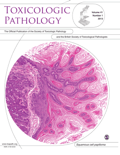
TOXICOLOGIC PATHOLOGY
Innovating Insights into Toxicologic and Pathologic ChallengesTOXICOLOGIC PATHOLOGY, published by SAGE Publications Inc., is a dedicated journal that serves as a pivotal platform for researchers and professionals in the fields of toxicology and pathology. With an ISSN of 0192-6233 and E-ISSN of 1533-1601, the journal has been committed to advancing knowledge since its inception in 1972. It boasts impressive rankings in the recent 2023 category quartiles, achieving Q2 in Pathology and Forensic Medicine, and Q3 in Cell Biology, Molecular Biology, and Toxicology, marking it as a significant contributor to these vital disciplines. Despite its non-open access status, the journal ensures accessibility through various premium library subscriptions, providing readers with essential insights on toxicologic and pathologic research, advancing both academic inquiry and practical applications. Researchers, students, and industry professionals alike will find TOXICOLOGIC PATHOLOGY an indispensable resource, offering high-quality peer-reviewed articles that explore the complex interactions between substances and biological systems, with the aim of improving public health and safety.
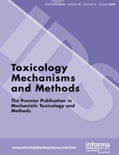
TOXICOLOGY MECHANISMS AND METHODS
Advancing toxicological insights for a safer tomorrow.TOXICOLOGY MECHANISMS AND METHODS is a distinguished peer-reviewed journal dedicated to the advancement of toxicological research, published by Taylor & Francis Ltd. With its ISSN 1537-6516 and E-ISSN 1537-6524, this esteemed journal features critical studies and innovative methodologies in the field of toxicology, aligning with its mission to enhance understanding of biological mechanisms and risk assessment. The journal holds a commendable Q2 ranking in both the Health, Toxicology and Mutagenesis, and Toxicology categories, as well as strong positions in Scopus rankings, reflecting its influence with a 71st percentile rank in Toxicology and a 69th percentile rank in Environmental Health. Researchers, professionals, and students in the toxicology domain will find this journal to be an invaluable resource, offering open access options that foster widespread dissemination of its findings. Since its inception, encompassing converged years from 1991 to 1995 and from 2002 to 2024, the journal remains at the forefront of critical discourse and innovative research methods, making it a vital platform for advancing toxicological science globally.

JOURNAL OF APPLIED TOXICOLOGY
Unveiling the Complexities of Chemical InteractionsJOURNAL OF APPLIED TOXICOLOGY, published by Wiley, stands as a leading platform in the field of toxicology, focusing on the rigorous examination of chemical substances and their effects on biological systems. With an impressive Impact Factor, it ranks in the top quartile (Q2) for toxicology journals, reflecting its esteemed position within the scientific community. The journal, identifiable by its ISSN 0260-437X and E-ISSN 1099-1263, has been an invaluable resource since its inception in 1981, and it continues to serve as a conduit for innovative research and practical applications through 2024. Positioned at the forefront of the field, it garners recognition in the Scopus Rankings, where it ranks #31 out of 133 journals in the toxicology category, placing it in the 77th percentile—a testament to its contribution to the advancement of pharmacology and toxicological sciences. While not an open-access journal, it remains accessible to a wide audience of researchers, professionals, and students eager to explore cutting-edge findings in applied toxicology, making it a pivotal resource for enhancing knowledge and fostering collaboration in the field.
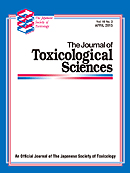
JOURNAL OF TOXICOLOGICAL SCIENCES
Exploring the Complexities of Toxic SubstancesThe Journal of Toxicological Sciences, published by the Japanese Society of Toxicological Sciences, is a prominent academic journal dedicated to the comprehensive study of toxicology and its related fields. Since its inception in 1976, the journal has provided a vital platform for researchers and professionals to disseminate innovative findings and insights in toxicology, with a focus on both experimental and clinical studies. Positioned in the Q3 quartile across various relevant categories, including Medicine (miscellaneous) and Toxicology as of 2023, the journal plays an essential role in advancing our understanding of toxic substances and their effects on biological systems. Although currently not open access, the journal maintains high academic standards and is indexed in Scopus, ranking #96 in Toxicology. Offering unique perspectives from Japan, it encourages global collaboration and discourse among toxicologists, making it an invaluable resource for students, researchers, and industry professionals alike.

Frontiers in Toxicology
Connecting Researchers to the Heart of ToxicologyFrontiers in Toxicology, published by Frontiers Media SA, is a prominent open-access journal dedicated to advancing the understanding of toxicological science. Established in 2019, it serves as a vital forum for innovative research, offering insights into the pharmacological impacts and toxicological profiles of various substances. With its international reach based in Switzerland, this journal has quickly ascended in the academic community, achieving a notable Q1 ranking in Pharmacology, Toxicology and Pharmaceutics (Miscellaneous) and a Q2 ranking in Toxicology as of 2023. The journal is indexed in Scopus, where it ranks #8 out of 43 in its primary category, underscoring its influence and relevance in the field. The scope encompasses cutting-edge studies on the mechanisms of toxicity, including both human and environmental impacts, making it an essential resource for researchers, professionals, and students alike. By promoting open access to high-quality research, Frontiers in Toxicology plays a crucial role in enhancing knowledge sharing and fostering collaboration across disciplines.